The Samsung Galaxy Tab S2 Review
by Brandon Chester on October 15, 2015 8:00 AM ESTSystem Performance
Tablets have always been devices where performance can be pushed further than a smartphone. There's much more thermal headroom and bigger batteries to drive high performance SoCs. Both Apple and NVIDIA have SoCs that cannot feasibly be put in a smartphone due to their heat and power usage, and these chips find their way into tablets where these factors can be managed and the additional performance can be utilized by more sophisticated applications. At the same time, some vendors opt to use the same silicon in both phones and tablets. In the case of the Galaxy Tab S2, Samsung has decided to use their Exynos 5433 SoC which previously shipped in the Galaxy Note 4 Exynos.
The CPU side of Exynos 5433 is a quad core Cortex A57 cluster with a max frequency of 1.9GHz, and a quad core Cortex A53 cluster with a max frequency of 1.3GHz. The GPU is ARM's Mali-T760 MP6 GPU with a max frequency of 700MHz. On average the results should be similar to the Galaxy Note 4 Exynos, although software improvements to both the browser as well as Android itself will obviously have an impact.
As always, the first group of tests are our web browser tests to characterize JavaScript performance, followed by BaseMark OS II and PCMark to evaluate the CPU and other aspects of a device's performance.
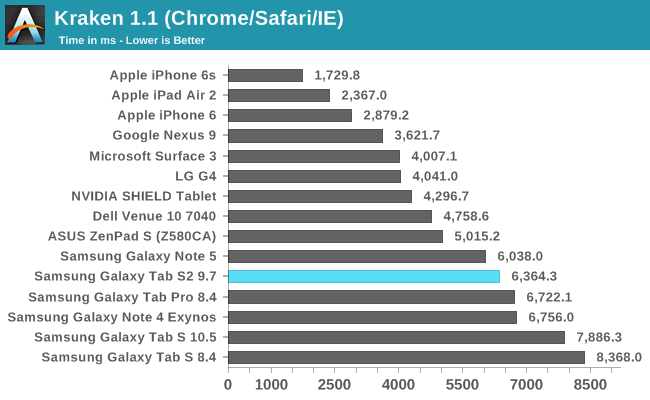
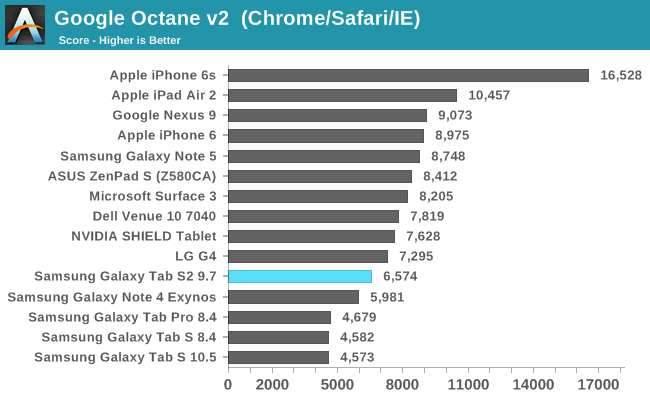
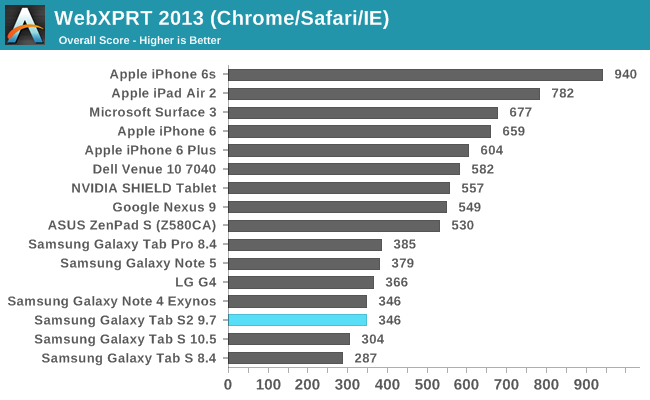
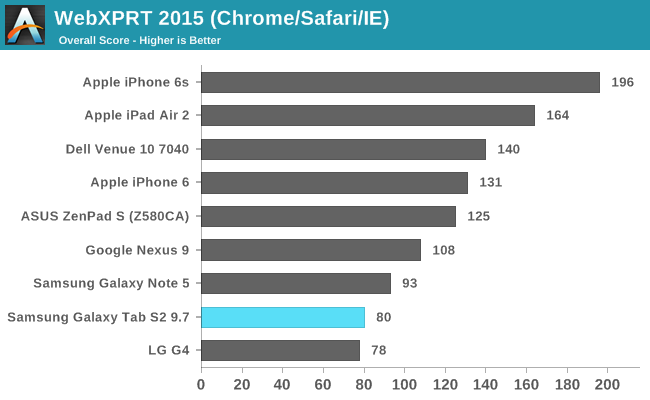
Android, and most specifically Chrome's lackluster JavaScript performance is something we've been commenting on for a while now. On top of that, the Galaxy Tab S2 simply doesn't have Samsung's latest and greatest SoC, and these factors combined together give results that aren't very impressive when one considers how much better the iPad Air 2 performs despite being over one year old at this point.
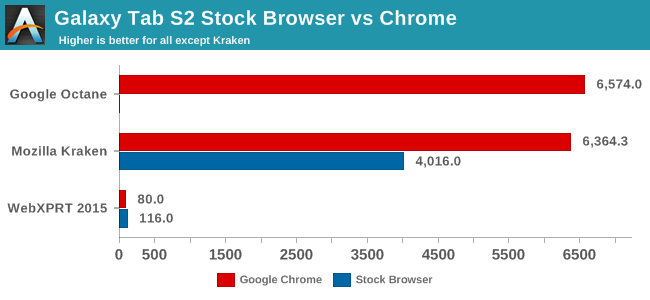
Looking at the Javascript performance in Samsung's stock browser provides some interesting but not unexpected data. It's clear that there's a much higher degree of optimization for Samsung's SoCs in their own browser than in Chrome, which isn't surprising. However, Samsung's browser isn't without its own issues. It actually crashes in the zlib test of Google Octane, and although the incomplete score of 7354 is higher than what Chrome achieves, the fact that the JavaScript code couldn't be properly executed points to some more concerning issues than performance
The other problem with using a device's stock browser for comparisons is that Android devices shipping with Google Mobile Services also include Chrome, and in my experience users are far more likely to utilize Chrome based on their awareness of the Chrome brand than they are to use the included OEM web browser. In short, while stock browser results may give a better idea of what kind of JavaScript performance a device is technically capable of, the Chrome results are more relevant when examining the performance and experience that the average user will have.
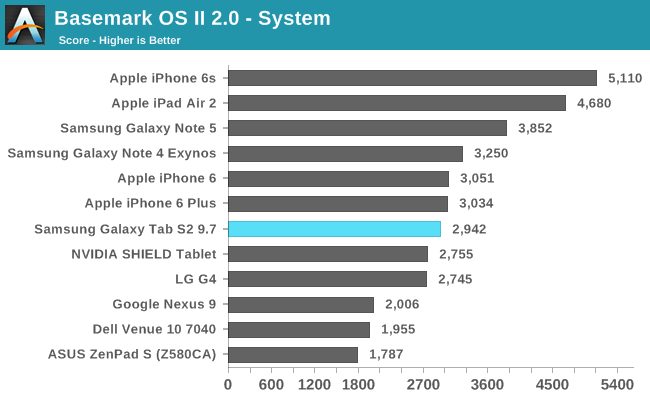
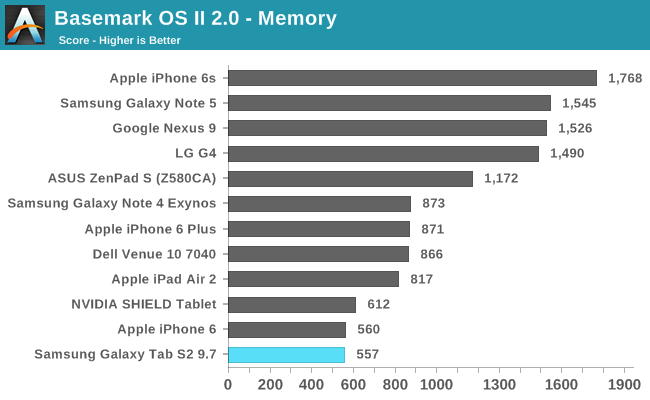
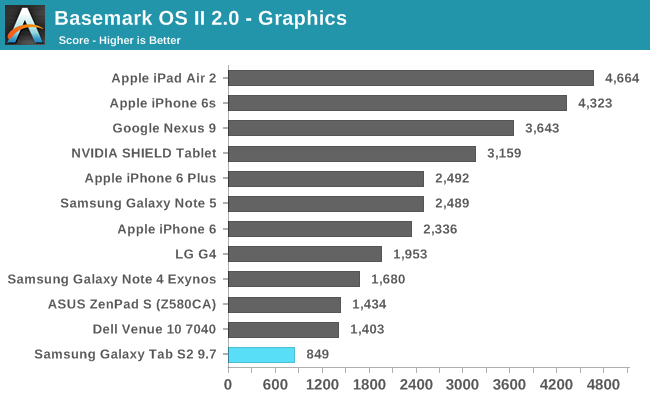
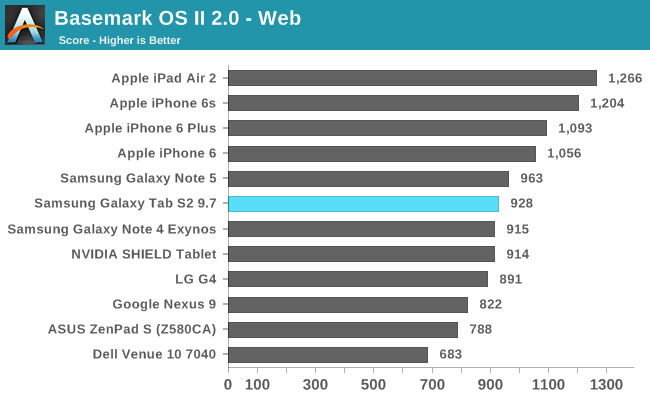
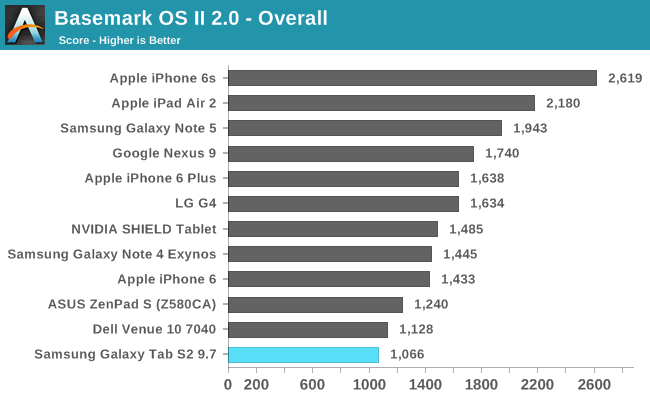
When examining the overall score in BaseMark OS II one may think that the Tab S2 performs extremely poorly. However, when looking at the sub tests it becomes clear that the overall score is being brought down by very low storage and graphics scores. What's surprising is the large gap between the graphics resuIts on the Tab S2 and the Galaxy Note 4 Exynos which uses the same Exynos 5433 SoC. I re-ran the benchmark several times to see if there was anything strange going on but there doesn't appear to be any problem with the testing, and I'm not quite sure why there's such a large gap between the two.
Moving past storage and graphics, the Tab S2 gets fairly good scores in the web and system tests. However, it still lags very far behind the iPad Air 2, and there's really no way to excuse this when both devices cost the exact same amount.
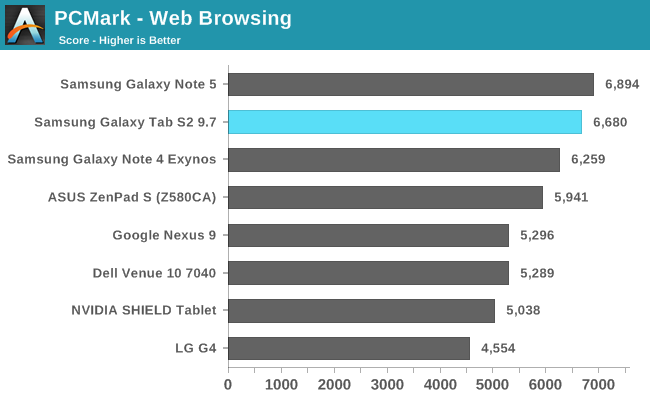
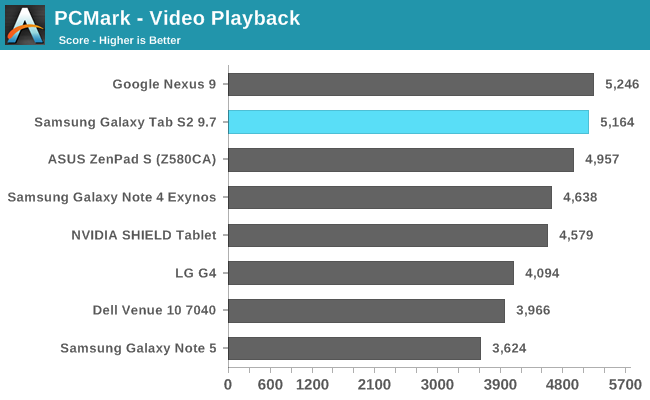
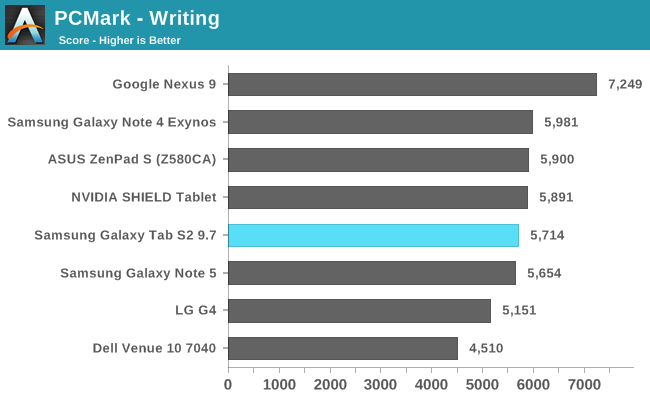
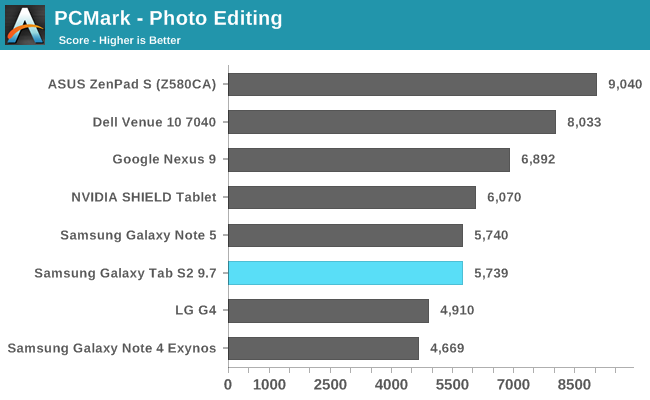
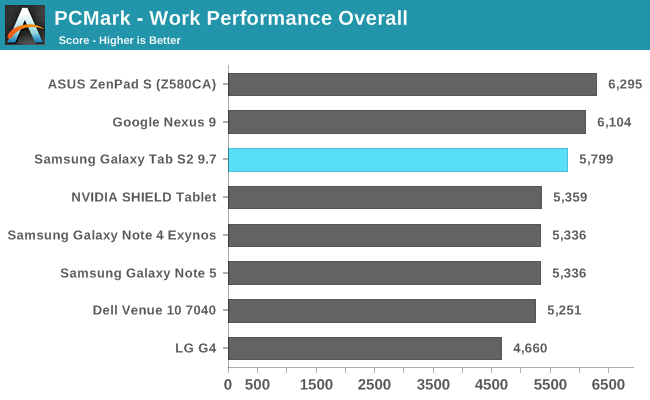
PCMark is still an Android only benchmark so the results here will strictly be comparing to other Android tablets. Overall, the Tab S2 does well. Upon examining the sub tests it can be seen that the Tab S2 is always fairly close the top of the charts, with certain devices achieving extraordinary scores in some tests which makes the Tab S2 look comparatively slower than it would be with more devices for comparison.
Exynos 5433 is not Samsung's best silicon, and even Exynos 7420 would likely struggle to compete with an SoC designed exclusively for full sized tablets. In the end the Tab S2's performance is just not competitive with the iPad Air 2 or even the Nexus 9 which is priced at $399 and often sells for even less. If I were looking at the 8" Tab S2 I would probably consider its performance acceptable relative to the competition at that size and price, but the market segment of full sized flagship tablets costing $500 or more is a completely other story.
I think Samsung definitely needs to reconsider their process of designing tablets, and part of that has to involve using chips that befit the larger size and greater capabilities of a tablet compared to a smartphone. It's in everyone's best interest to not have one company holding an enormous performance lead in any market, and if there's any company that has the capabilities, integration, and resources to fight with Apple over the tablet performance crown I would think it would be Samsung.










162 Comments
View All Comments
darkich - Saturday, October 17, 2015 - link
Brandon, there is a MAJOR omission in your take on the multitasking here..You missed the exact area where Samsung absolutely shines and sets itself far apart from any competition, in regards of multitasking, and that is WINDOW WITHIN WINDOW function.
Using multi window bubbles, user can use, move, open, resize and minimize multiple apps within each other, and they all remain FULLY DISPLAYED with no clipping and scaling issues whatsoever!
It really a complete, intuitive multitasking in the fullest sense of the meaning, unprecedented on tablets.
Here's what I mean:
http://tinypic.com/r/5ujuc7/8
Just made this screenshot on my Note 3(not even a tablet!), after opening Gmail, Play Store and the browser where I uploaded that image.
Oh and the keyboard remains fully usable throughout, taking its usual bottom half place.
So please, reconsider and revisit the software part of the review. This is a major deal, and the level of general public ignorance about it is obviously(since even you weren't aware of this feature) unacceptable.
Brandon Chester - Monday, October 19, 2015 - link
There no omission, it's mentioned in the software section, so I'm clearly not unaware of it. I didn't go over it in detail because the UX is no better than any of the other multitasking features and I already felt bad about criticizing Samsung for UX issues that they can't fix without control of the OS.darkich - Monday, October 19, 2015 - link
Well then, care to elaborate here under the radar, what's exactly wrong with Samsung’s multi window (and not the useless split screen function that you were describing)??As you can see I'm using multi windows on my small pocketable device and it works like a charm (except for hit and miss gesture that activates it), and on a big tablet screen that feature should absolutely be one of the highlights of usability.
darkich - Saturday, October 24, 2015 - link
Just like I thought.. You're left with NO ARGUMENT.Fact - Samsung’s multitasking in multi window mode is executed in amazing way (actually you don't even need to use the gesture, just tap on an app you want to add, after tapping on the plus window next to the app tray) yet you didn't knew lanything about it, and you *did not* mentioned it in the article.
nerd1 - Saturday, October 17, 2015 - link
One thing totally ignored in this review is that (non-american) cellular version of samsung tablets have full phone capability intact. That's the main reason I keep using samsung tablets, since OG galaxy tab 7". You save a lot of money just using one device for both phone and tablet, instead of buying two of them and using two separate plans.Achilles07 - Saturday, October 17, 2015 - link
It might be construed from the review that tab S2 is a slow performer given the lackluster performance figures in comparison to competition.On the contrary, I never felt the tab lagging in any applications during my daily work schedule with it. I use the MS powerpoint, and Word that came bundled with it. Not an issue at all. Opening up ppt with animations dragged a bit.
A tab of this functionality is a good companion for me in my office work and travel in metro.
I am not a gamer, so I cant comment on the gaming performance. But the real world performance as is as good as it can get for a tablet. For reference mine is the 8.0" LTE version.
KoolAidMan1 - Saturday, October 17, 2015 - link
Slower performance, poor security, no guarantee of OS updates, poor developer support and bad apps, and someone will still try and explain why Android is somehow the better platform.darkich - Sunday, October 18, 2015 - link
All Samsung high end product are basically guaranteed to receive updates for about two years.Android now has around 65% tablet market share, with a tendency of increase so that in the long term means developers will naturally have to support it.
As for other things, Android is vastly superior in terms of customization and third party apps - myriad of fantastic browsers (while iOS basically allows just a reskinned safari apps), media players, app managers, keyboards, widgets..
Also, Android allows full system access and file management which should be an absolute must on a tablet OS.
AND, you can connect peripherals (keyboard, mouse, USB) just as easily as you can with a Windows device.
Enlightened yet?
toyotabedzrock - Sunday, October 18, 2015 - link
Sounds like Google has lost interest in Android and Samsung thinks or rather isn't thinking about the need to compete with Apple by using a more well equipped SOC for the tablet and doing very little software wise.doggface - Sunday, October 18, 2015 - link
And Samsung just announced they are not going to update the software on this tab any further. In a statement the company said "3 weeks of updates are plenty" /s